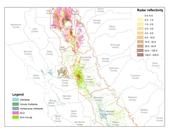- Author: Pamela Kan-Rice
- Author: Trina Wood

The same weather radar technology used to predict rain is now giving UC researchers the ability to track wild birds that could carry the avian influenza virus. Avian influenza, which kills chickens, turkeys and other birds, can take a significant economic toll on the poultry industry. In 2014- 2015, the United States experienced its worst bird flu outbreak in history, resulting in more than 48 million birds dying in 15 states, including California.
“We use the existing network of weather radar stations in the U.S. in the same way that radar is used to track rain, except that we process the data to allow us to interpret the radar signal bouncing off birds...

UC Agriculture and Natural Resources (UC ANR) provided seed money to launch a new Pastured Poultry Farm at UC Davis. The farm is home to 150 young chickens and a living laboratory where students and faculty researchers hope to develop innovative solutions benefiting pasture-based farms, integrative crop-and-poultry farms and backyard flocks.
Pasture-based chicken production offers many benefits as well as some challenges in terms of food safety, animal health and welfare, and environmental impacts, said Maurice Pitesky, UC ANR Cooperative Extension poultry specialist with the School of Veterinary Medicine and co-leader of the poultry...
- Author: Monique Garcia Gunther

With a potential increase in avian influenza this fall when wild waterfowl migrate south from their northern breeding grounds, chicken owners should be extra vigilant to help avoid their birds contracting or passing the virus.
Protecting their birds against disease should be a priority for chicken owners, no matter what size the flock, according to Maurice Pitesky, a UC Agriculture and Natural Resources Cooperative Extension specialist in the School of Veterinary Medicine at UC Davis.
“Wild birds are the biggest risk because they can carry the virus but look completely...



